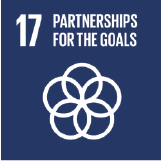

Relationships to Support the Goals
Strengthen the means of implementation and revitalize the global partnership for sustainable development.
KFUPM has collaborated with several organizations including regional NGOs and Government to identify problems and find solutions for diverse SDG-related topics. Two outstanding examples are firstly, the signing of three agreements with the Ministry of Labor and Social Development in the areas of volunteering and supporting the non-profit sector, promoting volunteering as a systematic and sustainable impact, all according to sustainability goals.
Secondly, the Al Fozan Academy, a joint cooperation between KFUPM and Al Fozan Social Foundation Program, seeks to train a generation of leaders who are able to efficiently manage third sector institutions in order to perform their required role in community by building, designing and implementing professional excellence programs. This is addressing the Thriving Economy pillar of the Kingdom’s vision 2030.
Furthermore, KFUPM continuously participates in cross-sectoral dialogues about the SDGs. KIKX (KFUPM Institute for Knowledge Exchange) holds regular seminars, workshops, and forums where specialists from around the world are brought together to discuss emerging topics in the field of sciences that can help humanity.
Recently, the university took part in the MENA Climate Week and inaugurated the first ever training course on Circular Carbon Economy in collaboration with the University of Oxford and KAPSARC. This workshop falls under the Circular Carbon Economy Regional Collaboration Initiative, a pivotal part of The Middle-East Green Initiative.
Also, KFUPM initiated its first research consortium (Sustainable Future), providing a platform that brings together collaborators from academia, industry, and government to tackle some of humanity's most pressing challenges.
It adopts a futuristic, materials-based approach to overcome obstacles to sustainability by creating and upscaling a wide range of innovative solutions essential to achieving a sustainable future.
To assist the country and the world in gathering and measuring SDG-related data, KFUPM faculty helped in collecting data for the National Communication (NC) in 2005, 2011, 2016, and 2022 as well as the Biennial Update Report (BUR) in 2018. These reports highlight steps taken to address article 12.1(b) of the United Nations Framework Convention on Climate Change (UNFCCC) and include a large number of studies mainly pertinent to national greenhouse gas emissions inventory, climate change mitigation initiatives, socio-economic impacts of climate change, response measures, climate change vulnerability, climate change research, education, training, capacity building, and public awareness. UNFCC Saudi Arabia NC4
One of KFUPM’s main tasks as a university is to educate students about the importance of volunteer work and how to be an active member of society. For this reason, KFUPM runs an annual volunteer day that focuses on areas such as health, the environment, retirement homes, rehabilitation centers and traffic safety. The Volunteer Day Festival serves the university’s mission to help the community through programs, with the participation of the KFUPM students and employees.
Moreover, as mentioned above, the Ministry of Labor and Social Development has signed three agreements with KFUPM, two of which are concerned with the organization and empowerment of voluntary work in governmental and non-profit organizations. The third relates to the construction and development of standards and professional qualifications for non-profit sector jobs. Al Rajhi Humanitarian Foundation and Abdullah bin Ibrahim Al-Subaie Charity Foundation are two NGOs to establish volunteer units.
Education for the SDGs
KFUPM is committed to providing a meaningful education around sustainability across the university. It has introduced a set of new Undergraduate Concentration (CX) programs. These programs align with Saudi Arabia’s Vision 2030 which relates widely to various SDGs. For example, one of the main pillars of the vision is “a thriving economy where everyone has the opportunity to succeed.” Concentration areas cover climate change adaptation, energy efficiency, smart and sustainable buildings, renewable energy and energy storage or waste management. Most BSc. students in their final year enroll in these programs as part of the degree.
In addition, KFUPM has also introduced new Master’s degree programs (MX), aligned with global trends, the job market and the Kingdom’s vision 2030. Amongst them are dedicated courses that address sustainability, for example Master of Engineering on sustainable and renewable energy or Master of Smart and Sustainable cities.
Furthermore, KFUPM was involved in the Energy Debate, a program that aims to provoke Saudi Youth, mainly students and young professionals, to rethink energy and its sustainability. It is just one amongst many more programs the university plans to introduce, programs that align with different SDGs to equip the new generation with the knowledge needed to achieve and maintain these goals.

Supporting Documents
- Collaboration with the Ministry of Human Resources and Social Development
- Volunteering and supporting the non-profit sector
- Non-Profit Sector Development Forum
- Supporting the governments on clean energy
- Fourth National Communication Kingdom of Saudi Arabia
- Assessment of energy and environmental sustainability in South Asia
- KFUPM Consortium for a Sustainable Future
- The 15th Volunteer Day
- Undergraduate Concentrations at KFUPM
- Master of Smart and Sustainable Cities
- Master of Engineering Program in Sustainable and Renewable Energy
- KIKX - KFUPM Institute for Knowledge Exchange
- Energy Debate
- MENA Climate Week
- Al Fozan Academy
- Sustainability Awareness Quiz
- Sustainability Training Report